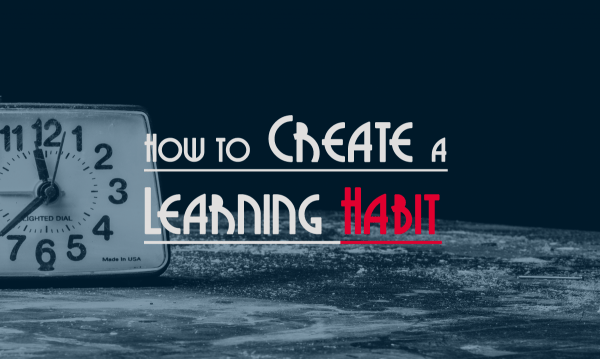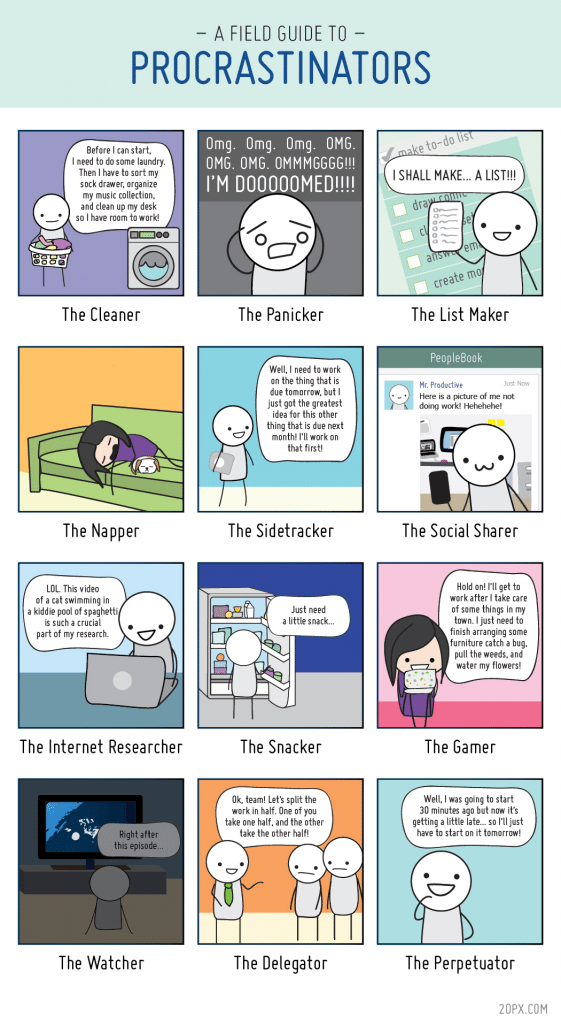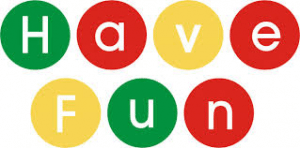We all have come across books and articles that tell us in so many words how to make a habit stick. The question is, were you motivated enough to learn the habit that will make you learn a new habit? (confusing, huh. But I swear I'm making sense here.)
Here in this article, we will try to break down into little parts the tips on how to make brand new habits, and use these to learn a new language, which is in this case, French.

Learning a new language is difficult. It takes time, effort, and lots of patience. In order for it to become truly ingrained into your system, you have got to make a habit of studying it, and later on, speaking it on a regular basis.
But how can you train yourself to be committed enough to stick to your goals in learning a new language?
Part 1: Why do people fail to stick to a habit?
This does not only apply to learning a new language, but also to all other aspects in your life-–be it living healthier, dieting, exercising, being debt-free, or many other possible life-changing scenarios.
1. It's hard.
Let's face it, habits are extremely hard to form. You have spent so many years doing what you do, making yourself learn to change a certain pattern in your life can be a truly daunting task.
2. Forcing yourself to create a new habit could become a burden.
You know the feeling when you start to dread doing something you have set out to do? Well, we have all been there. Whether it's setting aside a few hours a day to learn a language or starting out on a new strict exercise routine, the more we wait for that hour to come, the more we start dreading it.
3. Changes in your routine.
So let's say you have already been making a headway with a habit you're trying to form. But just as you are already getting the hang of it, you get called on an urgent business trip, or you get sick, or visitors suddenly came over and visited for a few days. That disruption would make it difficult for you to go back to the habit that you have just started forming (and that totally sucks).
4. You lack the motivation to continue.
If you are not properly motivated to do a personal project, nothing on Earth can make you persist on doing that.
5. Excuses galore!
You are awesome at talking yourself out of something. You're the king or queen of reasons and excuses! You think of the brightest reasons why should not be doing it. Now, why don't you try to use those brilliant powers of persuasion to convince yourself to stick to a good habit, eh?
6. You get discouraged.
You get discouraged or intimidated and tell yourself you can't really do it. This happens even to the best of us. Once we experience difficulty in getting the results that we expect, frustration rears its ugly head and we often just hunch our shoulders and think, “maybe I'm just not cut out for this.”

Speak, Listen, and Write French like a Native with Talk in French Complete Courses
7. Negative remarks.
You hear a negative remark and suddenly you change your mind.Negative people are all around us. Their words could immediately stop us dead on our tracks and make us let go of the habits we have carefully made an effort to form.
8. Procrastination.
Who hasn't ever fallen prey to this major productivity killer? We tell ourselves that soon there will be a perfect time to do it. Or you can't do it now with all the work piling up, and the house work to do, the errands to run. There's so much to do, but soon, really, you'll definitely make time for that.

Which one are you?
(Note: We could no longer find the original source of this comic. Please let us know if you do.)
9. Too much beginner's enthusiasm.
Sometimes we get so excited about a prospect of doing something new that we spend too much time in the beginning until gradually the excitement fizzles and just evaporates.
10. Boredom gets to you.
Doing something repeatedly for a period of time can become really, agonizingly boring.
Among all of those listed, which ones suit you best?
But the good news is, once you have pinpointed the reason that makes it very difficult for you to stick to a habit, you can now move on to bigger things such as...
Create an effective learning habit with the e-book My French Routine (Vol 1 -6 available). Get your copy today!

Speak, Listen, and Write French like a Native with Talk in French Complete Courses
Part 2: How to really make a habit stick
Here is another list of ten things that will help you maintain a fixed routine for learning a new language, among other great personal projects.
1. Set your goals.
First of all, you have to know your goals.
What is it exactly that you want to achieve?
Your goal must be identifiable and specific. It could be to:
Make it as specific as you can. But most of all, know exactly what it is that you want.
2. Set a reasonable deadline.
A goal is not a goal without a deadline. That line has been said over and over and that doesn't make it any less true. Without a deadline, how can you determine your success? How can you further divide your goals into smaller goals if you cannot identify a proper milestone? You have to make sure though that the deadline is reasonable enough for you.
If you set a very long deadline, chances are you could get bored and abandon the project entirely. If you set a very tight deadline you run the risk of getting frustrated with yourself and intimidated at the prospect of not being able to finish it on schedule.

3. Set expectations.
You know yourself best, so figure out what you expect from yourself, as well as from the project. Don't set unrealistic expectations or you'll become disillusioned and frustrated.
4. Find the proper motivation.
Visualize yourself doing the thing that you wanted to achieve. Do you want to be a fluent French speaker? Imagine yourself conversing fluently in French. Write down the goals you have previously identified and always look at it whenever you have the chance. Place it in your wallet or stick it into your bulletin board or on your fridge.
The point is, the more you are reminded of your goal, the more driven you will be to achieve it.
5. Cut down your goals into smaller, chewable pieces.
Create small quotas for you to do everyday. You could start with one lesson per day or even just one short topic per day. Don't over exert yourself, but don't make it too easy for yourself either.
6. Know when to start.
Avoid procrastinating on your goal. Work on it immediately. The best time to start? Now! Go ahead before you change your mind once again and you start to think of all the reasons why you can't work on it yet. It doesn't matter how lofty your goals are. If you don't start on it, it's not going to get itself accomplished on its own.
7. Celebrate small successes.
So you already know the basic conversations in French? Good for you! Go ahead and pour yourself a glass of wine and give yourself a toast (in French of course!)
8. Make sure to do it everyday.
A habit doesn't get formed if you don't do it regularly. So set aside some time everyday for the next 3 weeks. Train yourself to make it part of your routine. You don't have to go big immediately, start small and increase the tasks later on once your system has properly assimilated with the new pattern.
Some people claim that it takes 21 days for a habit to get formed, but other people are busy disputing that fact. But no matter who's wrong or right, the key is to keep doing it until you become so accustomed and it becomes a part of your schedule. Skipping two days won't help. By the third day it will be so easy to talk yourself into missing another day altogether, until eventually you have stopped.
9. Guard your thoughts.
Do you suddenly feel like stopping? Do you start to feel like you're not making any progress at all?
Examine those thoughts and the reasons behind it.
Maybe you have set really high expectations and you only need to lessen those.
Perhaps someone reeking with negativity told you that you can't possibly do it. So why listen to him and not prove him wrong?
Or could it be that you are not motivated enough? In which case you should amp up your motivation by giving yourself some highly rousing pep talks. The point is, only you can control your thoughts. So be in control. Keep yourself on track.
10. Have a blast!
The last but definitely one of the most important thing is to have fun! Treat learning a new language as something new and exciting and a totally amazing journey. It will open up new worlds for you.
Remember, investing on yourself and your abilities is the best kind of investment there is. Dwell on that fact and be happy about it. So stop being so uptight and quit driving yourself to a wall. Cheer up and have some fun! Beating yourself to a pulp just because you think you don't have enough discipline and persistence to stick to your habit is NO FUN AT ALL.
The journey itself is supposed to be a happy, enjoyable experience, not something to be imposed on yourself and then dreaded afterwards.

Have a GREAT TIME! Remember that if it isn't fun, it isn't working!
This list of French movie recommendations will help you for starters!
How to Learn French with Movies in 7 Easy Steps (+ free e-book)
Part 3: Some motivational quotes to keep you going
If you need a push in the direction of your language learning goals, here are some great quotes to get you started. Write it down and post it somewhere you could see!
Conclusion
Something as difficult as learning a new language requires you to form a learning habit that goes on for a long period of time. But with the right mindset, the proper motivation and planning, this habit could be ingrained into your system soon enough.
For more related articles about creating a learning habit, see the following:
A 20-Day Guide on How to Make Learning French a Habit
Learn French: Your 21-Day Guide on How to Make Listening a Habit
Create an effective learning habit with our courses. Check it out below.

Speak, Listen, and Write French like a Native with Talk in French Complete Courses
![]()
![]()
I hope you picked up something from this article to help you in your journey to learning French. Best of luck!
Let me know what you think and if you have any questions in the comment section below. Cheers!

[…] our article How to Create a Habit: A Guide for Language Learners, we have already established that the best way to learn a new language is to make a habit out of […]
[…] Learning a new language is difficult. But you know what makes it a lot better? Making a habit that sticks. We’ll show you how. […]
Bonjour Frederic,
this is all great advice and very helpful, merci.
I would like to add another tip that has worked for me. Get a Language Exchange partner. Find someone that is a native speaker of your target language and help keep each other accountable.
Yes it is a valid option. The only challenge is to find one motivated as much as you are.
What are your thoughts as far as using Rosetta Stone for learning French? Do you think It works effectively?
I think your podcasts are awesome. They are a lot of fun to listen to, but it isn’t very interactive.
A podcast cannot be interactive, and the main purpose is not to teach you a lot here. I think there is some good podcast like French Coffee Break for that. About Rosetta Stone since I never tried I have zero idea about it. I am not totally convinced by these methods (Pimsleur, Rosetta Stones…) . Moreover These methods focus on beginner and low intermediate level. There is probably some limitations (you need to practice your hard learned French). I think Benjamin Houy from frenchtogether.com review some methods. You might check it out his website https://frenchtogether.com/
Thanks for the mention Frederic.
I agree with you, most methods target beginners, if you already have a good level in French, you can probably learn much faster and in a much more fun way on your own. The available methods (the ones I reviewed at least) are a great way to get started, but once you already know French, practicing is the best thing to do in my opinion.
Hi Frederic
Thanks for an interesting post on procrastination. I am a master procrastinator, so I related to it very well.
I love your idea of learning French in bite size pieces, otherwise it can be overwhelming. I look forward to more French lessons …
Ingrid
Oh sure, procrastination is our nemesis. Let me know if you know some good tips to avoid procrastination.
Frédéric, merci pour ton article;vous avez raison,
c’est difficile à faire et tenir les bonnes habitudes.
J’ai le ténacité à continuer
d’étudier et d’apprendre cette
langage belle, parce que
j’aimerais comprendre et parler complètement, à
connaître parfaitement,
français:-)J’espère que je
peut! 🙂
Vous réussirez dans vôtre sujet, avec une manière très
intelligent et très pensante.
Et aussi – vous savez que
le travaille pouvoir plein de
( plaisir…I am saying here
that you know that the work (to learn French ),can be so much
fun…comment dit-on «fun and
adventure» en français?
Merci,Frédéric! 🙂
À bientôt.
Chiara
Bonjour Chiara, Fun and adventure = amusant et une aventure. 🙂
[…] slutar på -AR kallas -AR verb hablar tomar estudiar preparar Aha! Me encanta escribir en español. How to Create a Habit: A Guide for Language Learners – Talk in French. Pin by Rocky Nicolls on Foreign Language learning. Material didáctico. Francia Está usted en: […]
[…] How to Create a Habit: A Guide for Language Learners – Talk in French. […]
Bonjour Frederic,
Merci beaucoup pour ton blog. C’est tres interessant et utile 🙂
Apprendre francaise est plus facile!
Bonjour Frederic!
I have just recently decided to learn French for fun, adventure, and something to do on my days off besides watch TV and vacuum cat hair. I am very happy to have found your blog and plan to make good use of it. Thank you in advance!
Your fellow macaroon addict,
Eva
I am always the list marker, side tracker and never accomplish anything at the end of the day. Ideas comes but I would want to do everything at once and end up doing nothing. But with this writeup, I will try and organize myself so as to achieve more
This was speaking directly to me! I have felt like giving up but I truly want to learn to speak French. Such a beautiful language. Thanks for the inspiration❣️
I am glad you liked it.